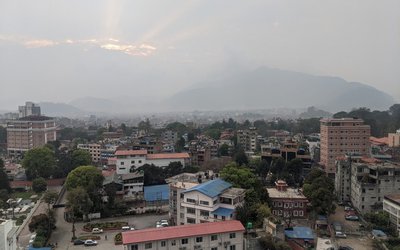Nepal is going through very distressing times, where Tuesday’s earthquake has added to the devastation of the April 25 disaster and has heightened a sense of panic.
On behalf of the IDPG, I offer our condolences on the tragic loss of life and reinforce our solidarity and commitment to work tirelessly with the people of Nepal to rise to the challenges of relief to long-term recovery and reconstruction.
In this regard, I would like to present a brief overview of our coordinated effort to support the Government in undertaking a Post Disaster Needs Assessment or PDNA, as it is usually referred to. The PDNA is based on a methodology jointly developed by the European Union, United Nations Development Group and World Bank Group.
PDNA is a Government-led exercise and it is supported jointly by EU, UNDG, WB and, as in the case of Nepal, other partners such as the Asian Development Bank, Governments of Finland, Japan, Switzerland, and the United States.Several other IDPG members have offered to support the PDNA process, and participate actively, if required.
Immediately after the April 25 earthquake, the three principal agencies, EU, UN and WB, coordinated at both the Kathmandu and Headquarters level to scope the need for a PDNA, among other immediate post-disaster support activities, and invite other development partners to participate in the assessment to harmonize the overall support to Nepal and develop a comprehensive post-disaster recovery strategy under the leadership of the Government of Nepal.
At the first meeting on PDNA coordination in Kathmandu on May 4th, a consensus emerged among all development partners on supporting the Government in undertaking a people-centric, timely and efficient PDNA. Focal points from all DPs worked together to provide some input on Terms of Reference that have now beenfinalized by the National Planning Commission, the lead agency appointed by the Government for coordinating the PDNA exercise.
At the Development Partners meeting called by Finance Minister on May 7th, the development partners carefully took note of the timeframe envisaged by the Government to conclude the PDNA so as to be able to inform the upcoming budget due on July 15 as well as facilitate the planned Donor conference.
In addition to proposing some contributions to the guiding principles for the PDNA, the development partners also agreedat the May 8th IDPG meeting to:
Adapt the PDNA methodology to the context and timeline under GoN’s leadership; Establish clear milestones and timely mobilization of experts from participating agencies and GoN; Collate damage data from all ongoing assessments, includingGovernment agencies and humanitarian clusters for PDNA; and Ensure complete ownership of NPC/GoN of the PDNA process and cooperation of relevant line Ministries/departments.
The May 8 IDPG meeting was chaired by His Excellency theSwiss Ambassador and attended by the representatives from the ADB, EU, Finland, Germany, Japan, Korea, Norway, NRRC, WFP, UNICEF, UNHABITAT, UNDP, and the World Bank.
The NPC together with the PDNA partners are in consultation to finalize the scope and modalities of the PDNA with a view to launch the exercise at the earliest possible date. We had a very productive meeting on Thursday with the high level team appointed by NPC to lead the PDNA planning to discuss and finalize the Terms of Reference, and commence the PDNA exercise.
We, the development partners, attach the highest importance to this Government-led PDNA. In addition to assessing damage and recovery needs, the PDNA can also inspire a guiding framework to implement resilient and inclusive recovery and reconstruction warranted by these massive earthquakes, focusing on the most vulnerable populations to improve livelihood opportunities, notably also in the rural districts. It also opens up new opportunities to build back better, to enhance governance, and to expand partnerships including with the private sector along the way. On behalf of the IDPG I extend our full cooperation in the intense weeks ahead
Excerpts of the statement delivered POST DISASTER NEEDS ASSESSMENT (PDNA).
- TANAHU HYDROPOWER PROEJCT: A Significant Achievement
- Apr 15, 2024
- AMBASSADOR HANAN GODAR: Sharing Pain With A Nepali Family
- Mar 30, 2024
- VISIT OF KfW AND EIB TO NEPAL : Mission Matters
- Mar 25, 2024
- NEPAL BRITAIN SOCIETY: Pratima Pande's Leadership
- Mar 24, 2024
- NEPAL ARMY DAY: Time To Recall Glory
- Mar 15, 2024
















